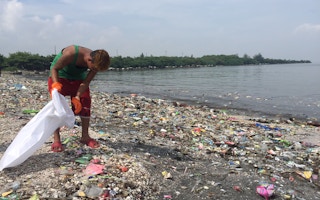Conservation groups in the Philippines are calling on president Ferdinand Marcos, Jr to reject a bill which gives producers responsibility for the treatment or disposal of post-consumer products.
To continue reading, subscribe to Eco‑Business.
There's something for everyone. We offer a range of subscription plans.
- Access our stories and receive our Insights Weekly newsletter with the free EB Member plan.
- Unlock unlimited access to our content and archive with EB Circle.
- Publish your content with EB Premium.
The Extended Producers’ Reponsibility (EPR) bill, set to lapse into law within the month, will be the first amendment of the country’s Solid Waste Management Act in two decades. It signals a move by the state to make companies accountable for their role in the country’s chronic plastic waste issue.
While the bill is a “meaningful step” to address the plastic crisis, the mechanisms in the bill can add to the climate emergency, said Marian Ledesma, zero waste campaigner for watchdog Greenpeace, in a virtual briefing of a coalition of green groups on Thursday.
“Given that the Marcos administration has been vocal about protecting Filipinos from climate change, the president must veto this bill because it can affect our climate goals,” said Ledesma. “[The bill] can worsen the situation through resulting greenhouse gas emissions from thermal treatment that the legislation institutionalises, and also the lack of bans or plastic reduction targets.”
The absence of a plastic reduction goal would allow companies their “unrestrained” use of plastic production, developing in more greenhouse gas emissions which cause extreme weather events and rising sea levels, Ledesma added.
At the briefing, Dr Gerry Paraso of Mary Johnston Hospital, a member of non-profit Healthcare Without Harm, cited research that showed how the burning of plastic releases toxic substances such as dioxins, furans, mercury, and polychlorinated biphenyls into the atmosphere, causing heart disease and respiratory ailments.
Bill does not explicitly allow thermal treatment
Thermal treatment refers to a process by which heat is applied to waste to sanitise it. Supporters of the new bill have point to the fact that it does not explicitly include the approval of such treatment of plastic waste.
“It should be noted that from a business point of view, this method [of thermal treatment] adds cost and is not an incentive for brand owners and producers as you need to pay facilities, when they become available, for this service,” Crispian Lao, founder of the Philippine Alliance for Recycling and Materials Sustainabiity (PARMS), told Eco-Business. The alliance’s corporate members include top local plastic polluters like Coca-Cola, Nestlé, Pepsi, Universal Robina, Procter & Gamble, and Unilever Philippines.
Froilan Grate, executive director of the Global Alliance for Incinerator Alternatives, believes, however, that just the mention of thermal treatment in the provision is a way for the method to be pushed forward.
“We know for a fact that language in laws is not very explicit or can be twisted. We know that ambiguity only allows for false solutions,” said Grate. “We have seen that happen in environmental laws in the past 20 years.”
Grate said he was referring to the country’s Clean Air Act, which had outlawed incineration, though the Philippine Department of Environment and Natural Resources (DENR) has since been pushing for waste burning as a mode of disposal due to the law’s ambiguity. Activists criticise this move as a violation of the regulation.
Not a genuine EPR?
The proposed measure in the new EPR Bill only requires producers of plastic waste to collect and recycle plastic packaging waste, without holding companies accountable in finding ways to reduce the production and use of plastic, said Coleen Salamat, plastic solutions campaigner of EcoWaste Coalition.
She called for the bill to be amended to also set targets on an “upstream” approach, instead of just the “downstream” side.
“Downstream” approaches refer to measures taken after a product is used by the consumer to make sure it does not end up in a landfill, such as recycling and reusing. “Upstream” approaches are those taken before a product is used to reduce waste, such as redesigning a product entirely or changing the material it is made of to make it reusable, recyclable, or biodegradable.
The bill requires companies to recover a growing percentage of plastic packaging waste they generate so that they do not end up in landfills. Starting December 2023, companies are to recover 10 per cent of their plastic waste footprint until they reach an 80 per cent recovery rate in December 2030.
There are currently 189 landfills in operation across the country, but the government plans to build 300 new ones within the year to help ease pressure on the existing ones which receive 12,091 tonnes of waste per day nationwide, equivalent to almost 600 garbage trucks,
Salamat said: “A genuine EPR follows the “polluters’ pay principle” that puts greater responsibility on those who pollute more, such as the plastics industry and fast-moving consumer goods corporations. This should go hand in hand with regulations banning single-use plastics. Unfortunately, the bill is polluter-friendly thus we urge the President to scrap the bill immediately.”










